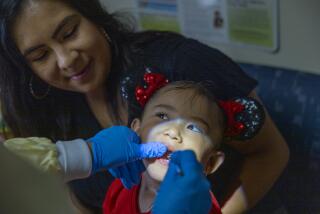Dentist Arrested in Death of Boy, 4, During Treatment
- Share via
SANTA ANA — A year to the day after a 4-year-old Santa Ana boy died during a routine dental appointment, one of the dentists who treated him was arrested Tuesday on charges of involuntary manslaughter.
Dr. Gabriella Thanh-Ngoc Pham, 35, was taken into custody in Whittier and charged with gross negligence in her treatment of Javier Villa. She faces a maximum of four years in prison if convicted. Bail was set at $50,000.
The arrest came a week after the California Board of Dental Examiners filed administrative charges against Pham and another dentist who treated the boy at the Santa Ana clinic, Dr. Miguel Garcia.
The board called the dentists “grossly negligent or incompetent” in their care of the child. An administrative hearing is expected before the end of the year to determine whether Pham and Garcia, her supervisor, should lose their licenses or face other sanctions.
Santa Ana police said the district attorney’s office has not determined whether to file criminal charges against Garcia.
The dentists have denied wrongdoing. Neither they nor their attorneys could be reached for comment Tuesday.
The boy was rushed to a hospital last Aug. 4 after a dental hygienist at the Megdal Dental Clinic noticed that he had stopped breathing.
The boy, who was at the clinic to have eight cavities filled, was strapped into a restraining device known as a papoose board and given 16 cubic centimeters of chloryl hydrate, an oral sedative that in large amounts can suppress breathing.
The amount of chloryl hydrate was at the upper end of the amount recommended for a child of Javier’s weight, said experts interviewed by dental board investigators.
Santa Ana Police Sgt. Steve Despenas said officials decided to press charges against Pham in part because a coroner’s report indicated that the boy died from positional asphyxiation.
A pediatric dental expert said that placing a rolled towel or pillow behind the boy’s head--considered a standard procedure--could have kept his air passages open and saved his life, according to investigators.
The California Board of Dental Examiners accused Pham last week of failing to recognize a medical emergency when the boy appeared to stop breathing and of failing to protect his airway.
According to the dental board charges, Garcia failed to evaluate the patient before treatment, allowed an unlicensed person to administer a so-called deep sedative and allowed the child to be over-sedated.
The board also said Garcia had placed his license at risk by not obtaining proper consent for the sedation, and by ordering the original dental record destroyed and a new one created. Clinic workers told investigators that Garcia ordered them to destroy Javier’s treatment record and say the boy received 6 ccs of the drug instead of 16 ccs.
“I’m glad to see it’s moving forward. I think we all are,” said John Hirai, supervising investigator for the dental board in Southern California.
Despenas said the timing of the arrest, on the first anniversary of the death, was coincidental. He said the investigation was lengthy because extensive toxicology reports and expert testimony were needed.
“It’s a form of closure, somewhat, [because] everybody has been wondering [the] ‘if’ and ‘when’ on this case,” he said.
Since 1976, according to the dental board, 10 children in California have experienced dental work-related deaths, eight from the use of oral sedatives. Other states have long required licensing or permits for the use of oral sedatives like chloryl hydrate on children, but California does not have such requirements.
Legislation that would require certification of the use of oral sedatives has passed the Assembly and, on Tuesday, won the backing of the state Senate Appropriations Committee.
Many dentists have objected to the law, saying that it could keep professionals who already feel over-regulated from treating children.
Philip Megdal, the owner of the clinic where the boy died and of several others across Southern California, is still being investigated by the state dental board staff, Hirai said.
More to Read
Sign up for Essential California
The most important California stories and recommendations in your inbox every morning.
You may occasionally receive promotional content from the Los Angeles Times.
![Vista, California-Apri 2, 2025-Hours after undergoing dental surgery a 9-year-old girl was found unresponsive in her home, officials are investigating what caused her death. On March 18, Silvanna Moreno was placed under anesthesia for a dental surgery at Dreamtime Dentistry, a dental facility that "strive[s] to be the premier office for sedation dentistry in Vitsa, CA. (Google Maps)](https://ca-times.brightspotcdn.com/dims4/default/8c153ef/2147483647/strip/true/crop/2010x1344+32+0/resize/320x214!/quality/75/?url=https%3A%2F%2Fcalifornia-times-brightspot.s3.amazonaws.com%2F78%2Ffd%2F9bbf9b62489fa209f9c67df2e472%2Fla-me-dreamtime-dentist-01.jpg)












